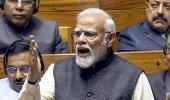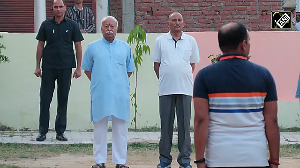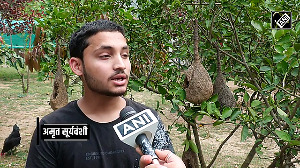If Modi wants to leave a real legacy, breaking India's strategic triangulation would be the real gift, notes Shekhar Gupta.

For the question asked most these days -- "So who's winning the general election and by how much?" -- let us, for now, take Prime Minister Narendra Modi at his word.
We can then offer him a 10-point wishlist of what he could -- and, in our view, should -- do in his third term.
Not only does he think and repeatedly assert that 2024 is a done deal, he is also acting as if the coming election is a mere campaigning interregnum between his second and third terms, which he takes for granted.
This recent Cabinet meeting, for example, was unusually long. He announced an important policy change, opening up the space sector to 100 per cent foreign direct investment.
He also asked his ministers to start preparing the agenda for the first 100 days of his next term.
It is a good time, therefore, for us to list our wishes for his third term. The first three emanate from ongoing political issues right now.
l. A final view on Other Backward Class (OBC) reservations must be taken. One option is for him to draw the line and declare that the status quo is final, and the 50 per cent limit won't be breached.
For this, even his party and allies have to stop tossing about issues such as Marathas or Jats, or further messing up Karnataka's ridiculous algebraic formula.
On the contrary, he could hold a nationwide caste census, determine who the OBCs are and close the issue.
If this means taking reservations beyond 50 per cent, so be it. Just put an end to the matter that keeps holding our politics to ransom.
2. He tried serious agriculture reforms in his second term but failed. In the third, he should invest real political capital and time in building the environment for the reform India needs most of all.
Aligning the farm and farmers with the market is far more challenging than P V Narasimha Rao's junking of the old industrial policy (licence-quota raj) because farming has political power.
Remember, Rao brought about his reforms with a minority government.
Modi should now have the courage to end the MSP regime.
It was a reform 60 years ago, but is market destructive, distortionary and anti-farmer now.
If the government needs grain for its food security reserves, it should buy in the open market and compete with private trade.
Trade should be freed so the challenges of seasonal boom-and-bust cycles, shortages and hoarding can be met through exports and imports.
3. Only a small percentage of Indian farmers produce surpluses in procurable volumes.
All landowning farmers get PM Kisan now, then trillions of rupees is spent on fertiliser, power and water subsidies.
All of these must go, and be replaced by one, sizable farming support in cash, even if the cost increases.
Pricing for all inputs should be determined by the market. That will dismantle so many agencies, bring efficiencies and, most importantly, save the environment -- especially water tables -- from ongoing destruction.

4. All of the other support schemes to the poor should go too and be replaced by one Universal Basic Income.
These include MGNREGA, free grain under NFSA, the cooking gas subsidy and so on.
A third-term majority government can and should do it. Remember the spirit of minimum government/maximum governance.
5. You might scream if I say abolish UPSC as it exists today. It has become a mechanical compete-by-rote government recruitment system at the top.
The competition is fair. But the system is gamed by dozens of multiple-hundred crore -- now some even unicorn-strength -- coaching academies.
Families from the middle, lower-middle and what Modi calls the neo-middle classes beg-steal-borrow to send their kids to sweaty, slummy dormitories in big cities, slogging in the face of near-impossible odds.
Millions of families are ruined or driven into debt as only a couple of thousands -- if that many -- make it.
Fundamentally, it's a giant transfer of beg-borrowed wealth from lower-middle India to the now increasingly private equity-addled coaching business.
This reform isn't just about family economics.
It is about a deeply calcified system of preparing by rote and killing innovation.
A new recruitment system must be found, and ultimately a similar philosophy should reform other competitions by rote, including JEE and NEET.
If Modi could abolish the Planning Commission and the Railway Budget in his first term and have Agniveers replace military recruitment in the second, we can set the bar higher in the third.
6. Now, let's delve into some political reforms. End the anti-defection law. After all the corruption and shenanigans we have seen, it is evident that the law is irrelevant and promotes horse-trading rather than curbing it.
It should be up to the parties to keep their coherence. At the same time, the whip system must go and be restricted only to finance Bills and confidence motions.

7. Electoral reforms should follow, and some of these will undo what was seen as reform in the past.
The ceiling on election expenses by candidates while their parties can spend unlimited amounts is nonsensical.
As is the Model Code of Conduct, since nobody cares for it.
The prime minister, for example, announced a nationwide free foodgrain scheme extension during the Chhattisgarh state poll campaign.
The other totally wasted idea is to stop campaigning 48 hours before polling.
Everybody violates it and in any case, digital and social media make it utterly outdated. Trying to enforce it is a case of too much government, zero governance.
8. In the two terms so far, Modi has gone back on three reforms: Land acquisition, agriculture reforms, and labour reforms.
He erred gravely in pushing them through without a real debate, and the first two through the ordinance route.
The first is partly resolved with the government offering a lot more and making the sale of land lucrative, and by exempting defence. The other two must return to the agenda.
9. Theaterisation is an epochal military reform and four decades delayed. It's a pity that the two Modi terms have failed to accomplish this.
The result is the kind of band aid/patchwork change we just saw with the creation of a new Army Corps facing the Chinese in the Middle Sector.
A third term, or 15 years in power with majorities, leaves no excuses.

The 10th and the last item on our list is the most challenging. For six and a half decades now, India's external security has struggled with a two-front challenge.
China uses Pakistan as a cheap instrument to triangulate India.
Modi has achieved much in India's foreign relations and strategic repositioning. Can he now rid India of the two-front curse?
It will involve settling India's disputes with at least one of our two nuclear neighbours.
It will be tough and fraught with political risks. But if Modi wants to leave a real legacy, breaking India's strategic triangulation would be the real gift.
Temples, he can keep building and rebuilding en passant.
By special arrangement with The Print
Feature Presentation: Aslam Hunani/Rediff.com












 © 2025
© 2025